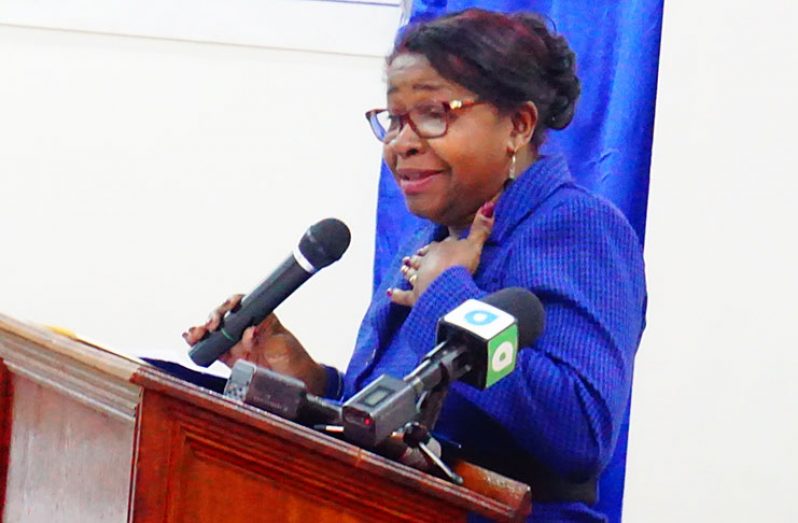— as National Library launches ‘smart skills’ training for young adults
By Elvin Carl Croker
THE National Library on Tuesday launched “Smart Skills Programme”, an initiative aimed at improving functional literacy in the employable age group.
Guided by the theme, “Empowerment through Improved Functional Literacy,” the National Library introduced the pilot phase of the programme.

The National Centre for Education Resource Development (NCERD), Director Jennifer Cumberbatch addressing the launch, hailed the programme as an excellent initiative.
She said every person should be literate, in that they should be able to read, write, interpret, follow instructions, understand and use printed information in their daily activity.
“Adults, who for a multitude of reasons, did not gain this foundation in their youth and who are now navigating the world without vital literary skills, are often overlooked. As a result of this they struggle in many areas to understand things like their electronic bills, instructions on a bottle of medication, etc.”
She emphasised that literacy does not only mean the ability to read, but also the ability to think about the information and solve problems. To this end, she said the programme will help them to not only gain, but retain employment.
Cumberbatch emphasised to the gathering that “education matters,” since it does have a role in crime reduction.
Chief Librarian Emiley King said the National Library must be aware of what needs exist within the community it exists and provide help.
“It was during the second quarter of 2016, during an examination of the libraries’ homework health programme, a decision was made to review and have it operate in a more restructured form,” she said.
Dr. Marcie Thomas, head of Information and Communication Technologies (ICT) at NCERD, commended the library for taking the bold, progressive step.
She interpreted ‘small skills’ to mean skills that pertain to the emotional and social intelligence of a person.
The entire “Smart Skills Programme” consists of five modules; however, only three of the modules formed the pilot phase. These modules are The Reading Course for Adults, which addresses the needs of persons who have gaps in their reading and writing skills; the Recognition and Signing of Names, which caters for persons who may still be using a thumb print as their signature for business and official purposes; and the Filling of Forms Module. The Filling of Forms module helps persons to better understand common terms usually found on forms and provide practice on completing several forms generally used by government departments and businesses in Guyana.
The other two modules, Financial Literacy and Health Literacy, will provide participants with a deeper understanding of money management through a series of interactive exercises: preparing personal and business budgets, using the ATM and shopping smart and giving guidance to strengthen their ability to read and understand basic medical and health information and how to ask questions of health professionals.
This programme targets persons who are employed or seeking employment, but lack basic functional skills, specifically focused on categories of workers such as labourers, sanitation/janitorial workers, porters, housewives, market vendors, young entrepreneurs and unemployed youths.
It seeks to help persons in the 17-35 years age group who need help to effectively apply literacy skills with confidence and to help them have less dependency on others for assistance.
The modules will be delivered by trained facilitators during the pilot phase over the next six months. During this time an assessment and evaluation of the modules and delivery methods will be undertaken to inform any adjustments necessary, before extending the programme to branch libraries and rural centres.
The programme was made possible through a collaborative effort of the National Library Smart Skills Programme, the National Centre for Educational Resource Development (NCERD) and support from corporate sponsors.
The library said it would welcome on board other corporate sponsors to ensure sustainability of the programme and invite such agencies to contact the chief librarian on telephone number 226-2690 or at email address, emileyking@yahoo.com for more information.


.jpg)











